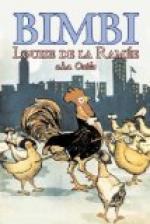The young duke and his court came riding down the street, and paused before the old stone house of the master-potter,—splendid gentlemen, though only in their morning apparel, with noble Barbary steeds fretting under them, and little pages and liveried varlets about their steps. Usually, unless he went hunting or on a visit to some noble, Guidobaldo, like his father, walked about Urbino like any one of his citizens; but he knew the pompous and somewhat vainglorious temper of Messer Benedetto, and good-naturedly was willing to humor its harmless vanities. Bowing to the ground, the master-potter led the way, walking backward into his bottega; the courtiers followed their prince; Giovanni Sanzio with his little son and a few other privileged persons went in also at due distance. At the farther end of the workshop stood the pupils and the artists from Pesaro and other places in the duchy whose works were there in competition. In all there were some ten competitors: poor Luca, who had set his own work on the table with the rest as he was obliged to do, stood hindmost of all, shrinking back, to hide his misery, into the deepest shadow of the deep-bayed latticed window.
On the narrow deal benches that served as tables on working days to the pottery painters were ranged the dishes and the jars, with a number attached to each—no name to any, because Signor Benedetto was resolute to prove his own absolute disinterestedness in the matter of choice: he wished for the best artist. Prince Guidobaldo, doffing his plumed cap courteously, walked down the long room and examined each production in its turn. On the whole, the collection made a brave display of majolica, though he was perhaps a little disappointed at the result in each individual case, for he had wanted something out of the common run and absolutely perfect. Still, with fair words he complimented Signor Benedetto on the brave show, and only before the work of poor Luca was he entirely silent, since indeed silence was the greatest kindness he could show to it: the drawing was bold and regular, but the coloring was hopelessly crude, glaring, and ill-disposed.
At last, before a vase and a dish that stood modestly at the very farthest end of the deal bench, the duke gave a sudden exclamation of delight, and Signor Benedetto grew crimson with pleasure and surprise, and Giovanni Sanzio pressed a little nearer and tried to see over the shoulders of the gentlemen of the court, feeling sure that something rare and beautiful must have called forth that cry of wonder from the Lord of Montefeltro, and having seen at a glance that for his poor friend Luca there was no sort of hope.
“This is beyond all comparison,” said Guidobaldo, taking the great oval dish up reverently in his hands. “Maestro Benedetto, I do felicitate you indeed that you should possess such a pupil. He will be a glory to our beloved Urbino.”
“It is indeed most excellent work, my lord duke,” said the master-potter, who was trembling with surprise and dared not show all the astonishment and emotion that he felt at the discovery of so exquisite a creation in his bottega. “It must be,” he added, for he was a very honest man, “the work of one of the lads of Pesaro or Castel Durante. I have no such craftsman in my workshop. It is beautiful exceedingly!”




